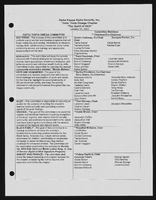Search the Special Collections and Archives Portal
Search Results
Bill Schafer Papers
Identifier
Abstract
The Bill Schafer Papers (1980-2018) contain personal and professional papers of Las Vegas, Nevada journalist and publisher, Bill Schafer, and photographs from various LGBTQIA+ related events in Las Vegas. The materials include files related to Schafer's work managing the
Archival Collection
University of Nevada, Las Vegas Solar Decathlon Records
Identifier
Abstract
The University of Nevada, Las Vegas Solar Decathlon Records (2013-2021) are comprised of records documenting the University of Nevada, Las Vegas's participation in the U.S. Department of Energy (DOE) Solar Decathlon collegiate competition. The collection includes records created by the 2013, 2017, and 2020 UNLV teams (Team Las Vegas) in designing and building their respective competition entries: DesertSol, Sinatra Living, and Mojave Bloom. Records include competition application files, working project files, As-Built submittal packets, and promotional and marketing files for the competition. The majority of records in this collection represent the 2017 competition. Archived websites and social media accounts associated with Team Las Vegas and the Solar Decathlon competition are also included in the collection. The records document Team Las Vegas's efforts in designing and building energy efficient homes for the Solar Decathlon competition.
Archival Collection
Southern Nevada Historical Society Photograph Collection on Basic Magnesium, Inc.
Identifier
Abstract
The Southern Nevada Historical Society Photograph Collection on Basic Magnesium, Inc. contains photographs of the construction of Basic Magnesium Inc.'s plants and buildings from 1941 to 1942. The photographs primarily depict aerial views of the plant site and various buildings, including the administration building, tent camp, chlorination buildings, electrolysis facilities, electrical distribution systems, and warehouses. The photographs also depict Lake Mead and the early buildings in Henderson, Nevada.
Archival Collection

Transcript of interview with Kent "Tim" Hafen by Gregory Hafen, March 4, 1975
Date
Archival Collection
Description
On March 4, 1975 collector Gregory T. Hafen interviewed his father, Kent (Tim) Hafen (born April 17th, 1932 in St. George, Utah) at his ranch home in Pahrump, Nevada. This interview covers the history and development of Pahrump from 1951 to 1975. Kent relocated to Pahrump, Nevada in 1951, after living in Mesquite, Nevada from 1932 to 1951. Kent was a local farmer.
Text
Julia Ratti (Washoe County Health District) oral history interview conducted by Kellian Beavers and Elia Del Carmen Solano-Patricio: transcript
Date
Archival Collection
Description
From the Lincy Institute "Perspectives from the COVID-19 Pandemic" Oral History Project (MS-01178) -- Government agency interviews file.
Text

Alpha Kappa Alpha Sorority, Theta Theta Omega Chapter list of committees
Date
Archival Collection
Description
From the Alpha Kappa Alpha Sorority, Incorporated, Theta Theta Omega Chapter Records (MS-01014) -- Chapter records file. Includes committee responsibilities, members, and chairs.
Text

Harold McKay interview, March 13, 1981: transcript
Date
Archival Collection
Description
On March 13, 1981, Dana Jamerson interviewed Harold McKay (b. July 27th, 1903 in Dresden, Kansas) about his life as a teacher in Las Vegas, Nevada. McKay speaks about his education, his move from Chicago, Illinois to Las Vegas and how he began his career in education. McKay focuses on how and why he founded the Teacher’s Credit Union, his time working in administration and his business school, as well as the problems related to segregation and integration in the educational system. Lastly, he talks about the growth of the gaming and entertainment industry in Las Vegas, and his volunteer work with the Senior Citizen Center.
Text

Transcript of interview with Frankie Perez by Elsa Lopez and Laurents Bañuelos-Benitez, November 5, 2018
Date
Archival Collection
Description
Frankie Perez (1986- ) is an individual that constantly found himself navigating two worlds, whether it was military versus civilian; female versus male; or being Latinx in the United States. As a result of this navigation, Perez has a unique perspective on our ever more complicated world that not many individuals possess. Perez served in the military during the Do Not Ask, Do Not Tell policy which made it difficult for someone dealing with gender identity, to seek out the proper support they need. Despite the policy, and other policies that were put in place afterwards to inhibit the transgender community in the military, Perez began his transition while still serving his country. In direct contradiction of popular opinion, Perez discovered that the military easily accommodated his transition. Outside of the military Perez is an active voice in the LGBTQ community. As a member of the LGBTQ, Latinx, and military community, Perez has a unique perspective that he uses to fight for both LGBTQ and Latinx rights. Currently, Perez is finishing his degree in gender and sexuality studies at UNLV. He hopes to use his education to help people have the difficult discussions and improve conditions for his communities.
Text


